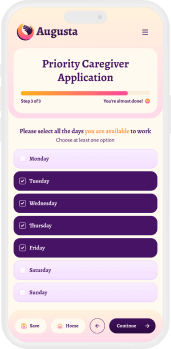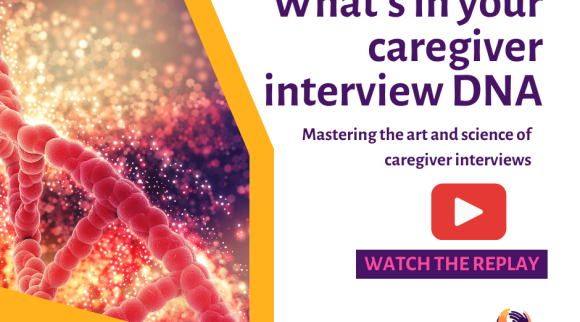Introduction
Strap on your seat belt and take a ride with us to caregiver interview triumph!🏆🚀
Immerse yourself in a realm of worthy insights, battle-tested strategies, and must-have tips for navigating caregiver interviews. Peel back the curtain on top interview questions and master the art and science of identifying solid answers. Surprise, leveling up your interviews starts with data-driven analysis! 🤓
Whether you’re a hopeful beginner or a seasoned hiring maestro, this session is your ticket to rocking caregiver interviews and strategy.
🙌 Check out the replay now! And the written version below!
Table of Contents
-
General rules of thumb for caregiver interviews
-
Interviews are a mutual sales pitch
-
The data and strategy on interviews
-
Ideal applicant persona
-
Types of interview questions
-
Examples of interview questions to align with your persona
-
“Why did you leave your last job?”
General Rules of Thumb
-
It’s a two way street!
-
Think about who you’re trying to find!
-
Decide what type of questions to use to get the information you need.
-
Always ask the same questions to every applicant.
-
Verify what they say by asking the same question more than once.
-
Be aware of your own state’s hiring rules.
Job interviews are mutual sales pitch; they’re stressful
We wouldn’t be here if it weren’t for caregivers! They usually need the job, financially sensitive making around $30K/yr or less. Their financial situation is inherently stressful; AND job interviews are stressful. Lower the cortisol levels and make your applicants feel comfortable, here’s how…
Examples of how to achieve a mutual pitch:
-
“So excited to talk with you! Before jump in, I want to make sure you know, we’re genuinely looking for the right fit for you and our company!
-
The call today is only going to be about 20 minutes, I’m going to ask you questions about your locations you’re traveling to, schedule, certifications, and relevant experience for this job.
-
I want you to ask whatever you want, too! If we both decide there’s a good fit here, then here’s what the next steps would be…”
The Data on Interview Strategy
It’s no ones fault, but “gut” decisions happen all the time. I know I’ve done it myself. The problem is, gut decisions are not data-driven. They’re inherently subjective and the data backs that up.

The “Who” book studied hiring from over 1300 hours of interviews with over 300 CEOs:
-
About half of the companies they studied made the wrong hiring decisions. Most hiring managers rely on their gut instincts.
-
Developing a systematic strategy for what to ask, when, and why is crucial. A key strategy of the authors is asking the same questions multiple times in different ways.
Unconscious and Affinity Bias Data
Bias in interviews happens all the time and it’s totally subconscious. But, as discusses above, it leads to subjective hiring decisions which don’t often align with Ideal Applicant Persona that you WANT to hire. Here two types of bias that show up in interviews and what you can do about them:
-
Unconscious bias = inadvertently reinforcing stereotypes.
-
Affinity bias = unconsciously gravitating toward people who seem similar to you in some way.
-
Why to care about this? A 2019 study showed that nearly 1/5th US economic growth in the last 50 years can be attributed to a more diverse workforce.
-
What do to about it? Have a grading rubric for answers. Gather the same background info and ask the same questions to every applicant in the same way.
Who is your ideal applicant persona and how do your questions align?
Dr. John Sullivan, professor at San Francisco State University and Author of 1000 Ways to Recruit Top Talent describes how to create your ideal applicant persona. “Look at your top performers. What do they have in common? What did they accomplish prior to working at your organization? What roles did they hold?” Once you’ve identified those answers you can identify the experience, behaviors and traits which enable you to construct relevant questions.

Top caregiver applicant persona example and related traits you want to identify:
-
cared for friends and family (compassion)
-
has worked at at least 1 job for more than 1 year (reliable)
-
has experience with unpleasant tasks or difficult behaviors (resilient)
-
they see their work as bigger than just them (aspiration)
Types of Interview Questions and Example Rubric
Typically not relevant for caregiver interviews (unweighted if you ask them):
-
Out of the box, brain teasers, subjective questions: Gauge critical thinking. “If you could travel through space, where would you go?”
-
Strength-based: How the applicant imagines themselves. “What are your strengths? Weaknesses?”
The next types of interview questions are often relevant for caregiver interviews. To make a very simple rubric, you could grade each of their answers to any of these types of questions as 33% of their interview score:
-
Behavioral: Focus on past behaviors. “how long did you care for that friend or family member? Why did you start caring for them to begin with?
-
Situational: Hypothetical. “Imagine X, Y and Z happened, what would be your next steps to tackle that situation?”
-
Competency-Based: Focus on the skills they’ve learned to use. “Tell me about a time something really difficult happened at work. How did you respond?”
Questions Aligning to Ideal Persona Described Above
Behavioral:
-
What was the last position you had where stayed with that company for at least 1 year?
-
What did your daily work include? Would your manager there be a reference?
-
Situational:
-
If your schedule were to change at the last minute before you had a shift with our company, what would you do?
Competency-Based:
-
How do you cook a meal?
-
How do you help someone go to the bathroom?
-
Tell me about a time where you dealt with someone very difficult? What happened, how did you resolve it?
Competency-based “STAR” method
The STAR method is a way to systematically break down someones answer into parts which you can more easily grade.
For instance, if you want to assess their ability to work independently, then your emphasis and best grade would be for answers which include the candidate trying hard to take care of the problem themselves. So, you’ll specifically listen for answers which include THEIR role in the task.
-
Situation – what was the situation they faced?
-
Task – what was the objective of the situation or task?
-
Actions – how did THEY go about tackling the situation and what was THEIR role in this. Listen for step-by-step actions.
-
Result – what was the outcome and were they objectives met?
STAR Method Example:
“Tell me about a time when you dealt with a difficult situation at work. What happened? How did you respond? What was the result?”
Situation – When I worked at Chipotle, there was a gentleman who would come into the store and just sit at a table for hours without ordering anything. He made the other customers uncomfortable.
Task – My manager asked me to talk with the gentleman and try to get him to leave.
Actions – I brought the customer a cup of coffee and asked how their day was going. I let them know our tables are for customers and asked where else he could go. I reiterated that unfortunately he can’t say here if he isn’t going to be ordering and will be disruptive to other people.
Result – The gentleman was irritated and started yelling. I went and got the store manager and asked them for help. After the manager talked with them, they did leave the store.
Candidates don’t give you all this information in an organized way, like in this example. But, when you have already decided what the most important part of their response is going to be it’s simple to identify the parts of their story that align to our ideal applicant persona. In this example, did they demonstrate a compassionate approach? Yes, they began in a kind way. They demonstrate resilience? Yes, they tried twice before getting help.
“Why did you leave your last job?”

-
Most likely question for someone to ‘game’ an answer! 2 BILLION results on google!!
-
Make sure you know ahead of time what your acceptable answers are and why. Don’t try to wing it based on how you ‘feel’ about their answer.
Let’s say one acceptable answer is that they didn’t like the client they had at the last agency they worked for.
You may want to plan to ask, additionally: “I want to make sure that doesn’t happen again, if you were to work with us. And, I’m sure you don’t want that either because you had to leave your job over it. Can you tell me really specifically what you didn’t like about working with that client?”
Maybe it was just how far away the client was. That’s really objective and you can tell them pretty quickly if you have clients who live closer to them.
If it’s because the client was really difficult, you can find out what was hard about it for them, and then provide appropriate training or match them with a client who has a lower level of care needs.


